|
|
|
Sort Order |
|
|
|
Items / Page
|
|
|
|
|
|
|
| Srl | Item |
| 1 |
ID:
167291
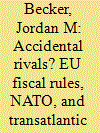

|
|
|
|
|
| Summary/Abstract |
Both theorists and practitioners continue to show interest in transatlantic burden-sharing. Resource allocation choices – both to and within defense budgets – are grand strategic choices, and membership in alliances and security communities affects how states make those choices. International security and political economy scholarship offers plausible explanations for transatlantic imbalances in military expenditures. However, NATO allies and EU member-states have pledged to one another not just to spend more on defense, but to allocate more defense resources to equipment modernization. Current scholarship does not fully explain the sources of such within-budget choices, which would help anticipate the likelihood of such pledges succeeding. Building on work by security scholars, defense and political economists, and scholars of interorganizational relations, I argue that stringent fiscal rules dampen the kind of defense spending NATO and EU strategists seek. Governments respond to increasingly stringent fiscal rules by reducing overall defense expenditures, while at the same time shifting existing defense resources to personnel, and away from equipment and operational expenditures. I find evidence in support of this argument by using education levels in the states in question as instruments for fiscal rules. This phenomenon represents a significant risk for important transatlantic strategic initiatives, namely NATO’s Wales pledge on defense investment.
|
|
|
|
|
|
|
|
|
|
|
|
|
|
|
|
| 2 |
ID:
154334
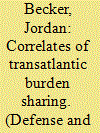

|
|
|
|
|
| Summary/Abstract |
While recent work has attempted to update the research agenda for transatiantic defense burden-sharing, there remain significant gaps between the public choice defense economics literature and the security studies literature. The presence of such a gap is unfortunate, because defense spending choices are likely shaped by factors identified by the public choice literature, as well as the strategic and cultural variables that the security studies literature tends to focus on, as well as domestic macroeconomic factors. The independent variables identified in recent qualitative literature are extremely useful analytically, and, fortunately, they have reasonable proxies in available quantitative data, which enables scholars to study them across large groups of countries and many years. This article builds upon such work to synthesize the most notable of the factors identified in the current literature, and offers some common analytical ground that will benefit both scholars and practitioners..
|
|
|
|
|
|
|
|
|
|
|
|
|
|
|
|
| 3 |
ID:
192045


|
|
|
|
|
| Summary/Abstract |
Cybersecurity plays a role in national security. This study introduces cybersecurity concepts in ways familiar to defense economists and identifies parallel methods of analysis in the fields. The theoretical tools of both fields include microeconomics and game theory. These tools enable analyses of phenomena present in both milieus: public goods, externalities, commons, incentives, interdependent security, platform economics, and inefficiency of decentralized decision making. Additional topics include cyber war, cyberterrorism, deterrence and disinformation in cyberspace, price of anarchy, and economics of cryptography.
|
|
|
|
|
|
|
|
|
|
|
|
|
|
|
|
| 4 |
ID:
162243
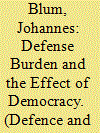

|
|
|
|
|
| Summary/Abstract |
Do democracies spend less on national defense? This paper provides new evidence of the effect of democracy on defense burden based on a Spatial Durbin Model with panel data for 98 countries for the years 1992–2008. While democracy measured by means of an index variable covering the entire range from perfect democracy to perfect autocracy turns out to be insignificant, dummy variables indicating transition to higher levels of democracy reveal a statistically highly significant negative effect of democracy on a country’s defense burden. Allowing for country-specific effects reveals heterogeneity in the effect of democracy across countries. Apart from the effect of democracy, the estimation results indicate strong spatial dependence of military burdens across countries. Moreover, they provide statistical evidence for a peace dividend, for substitution effects in defense spending and for a negative effect on the military burden for countries when they exhibit a trade surplus instead of a trade deficit.
|
|
|
|
|
|
|
|
|
|
|
|
|
|
|
|
| 5 |
ID:
113327
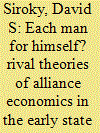

|
|
|
|
|
| Publication |
2012.
|
| Summary/Abstract |
When military alliances are expensive, they naturally raise distributional issues. This article considers two theories to explain how much a state will voluntarily contribute to the economic burdens of defense. Empirical work has relied largely on data from the twentieth century. This article provides an out-of-sample test to evaluate the models. Using data on the Quintuple Alliance, the results are more consistent with the predictions of the joint products model than the pure public goods model. Due to credible commitment problems, and intra-alliance cleavages, I argue that we should not expect substantial free riding in most conventional military alliances.
|
|
|
|
|
|
|
|
|
|
|
|
|
|
|
|
| 6 |
ID:
192533


|
|
|
|
|
| Summary/Abstract |
Major arms producing states and defense firms have struggled to supply the Ukraine war's massive demand for munitions. Key elements of the war—such as artificial intelligence-enabled analysis of data obtained from commercial surveillance satellites transmitted by the privately-owned Starlink network—have emerged from new providers as well as developed organically on the battlefield. Research failed to anticipate this due largely to the discipline’s focus on the “defense industry” rather than three distinct “defense industries” highlighted in the war: platforms such as tanks, commodities such as artillery shells and loitering munitions, and militarized “tech” such as commercial satellites and artificial intelligence. Understanding each requires a distinct political economic approach. Using these three lenses, the article concludes that the United States retains advantages in all three industries, Europe risks regressing into a commodities producer, and China seeks to disrupt, rather than duplicate, American defense industrial advantages in technology.
|
|
|
|
|
|
|
|
|
|
|
|
|
|
|
|
| 7 |
ID:
139213
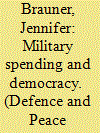

|
|
|
|
|
| Summary/Abstract |
This paper examines empirically whether democracies allocate fewer resources to the military than dictatorships. It employs a panel of up to 112 countries over the period 1960–2000 to estimate a standard demand for military spending model. While papers on the determinants of military spending generally include democracy as a control variable, with a few exceptions, it is not the focus of their enquiry. This paper addresses resulting problems in the existing literature concerning data quality and the appropriate measurement of key variables, as well as the question of causality between military spending and democracy. It finds that democracies spend less on the military as a percentage of GDP than autocracies do and that causality runs from regime type to military spending.
|
|
|
|
|
|
|
|
|
|
|
|
|
|
|
|
| 8 |
ID:
171017


|
|
|
|
|
| Summary/Abstract |
This paper discusses central ideas in the work of Charles Hitch. He is known for his pioneering contributions to defense economics and ‘systems analysis’ and for his introducing program budgeting in McNamara’s Pentagon. We discuss the evolution of his work and ideas, and how his views on systems analysis were influenced by his broader interest in human and organizational behavior. The paper also emphasizes Hitch’s skills as leader and manager of organizations (in particular as the head of the economics department at RAND).
|
|
|
|
|
|
|
|
|
|
|
|
|
|
|
|
|
|
|
|
|